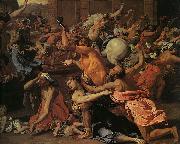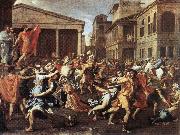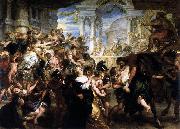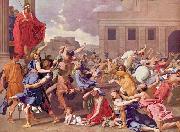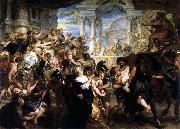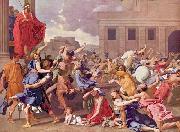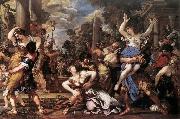Wholesale Oil Painting No Minimum |
|||||||||||
|
|
|||||||||||

|
|||||||||||
|
|
|
||||||||
Nicolas PoussinFrench 1594-1665 Nicolas Poussin Galleries The finest collection of Poussin's paintings, in addition to his drawings, is located in the Louvre in Paris. Besides the pictures in the National Gallery and at Dulwich, England possesses several of his most considerable works: The Triumph of Pan is at Basildon House, near to Pangbourne, (Berkshire), and his great allegorical painting of the Arts at Knowsley. The later version of Tancred and Erminia is at the Barber Institute in Birmingham. At Rome, in the Colonna and Valentini Palaces, are notable works by him, and one of the private apartments of Prince Doria is decorated by a great series of landscapes in distemper. Throughout his life he stood aloof from the popular movement of his native school. French art in his day was purely decorative, but in Poussin we find a survival of the impulses of the Renaissance coupled with conscious reference to classic work as the standard of excellence. In general we see his paintings at a great disadvantage: for the color, even of the best preserved, has changed in parts, so that the harmony is disturbed; and the noble construction of his designs can be better seen in engravings than in the original. Among the many who have reproduced his works, Audran, Claudine Stella, Picart and Pesne are the most successful. |
||||||||
|
|
||||||||
The Rape of the Sabine Women
The Rape of the Sabine Women Painting ID:: 2128 |
Metropolitan Museum of Art, New York Metropolitan Museum of Art, New York |
|||||||
|
|
||||||||
Nicolas PoussinFrench 1594-1665 Nicolas Poussin Galleries The finest collection of Poussin's paintings, in addition to his drawings, is located in the Louvre in Paris. Besides the pictures in the National Gallery and at Dulwich, England possesses several of his most considerable works: The Triumph of Pan is at Basildon House, near to Pangbourne, (Berkshire), and his great allegorical painting of the Arts at Knowsley. The later version of Tancred and Erminia is at the Barber Institute in Birmingham. At Rome, in the Colonna and Valentini Palaces, are notable works by him, and one of the private apartments of Prince Doria is decorated by a great series of landscapes in distemper. Throughout his life he stood aloof from the popular movement of his native school. French art in his day was purely decorative, but in Poussin we find a survival of the impulses of the Renaissance coupled with conscious reference to classic work as the standard of excellence. In general we see his paintings at a great disadvantage: for the color, even of the best preserved, has changed in parts, so that the harmony is disturbed; and the noble construction of his designs can be better seen in engravings than in the original. Among the many who have reproduced his works, Audran, Claudine Stella, Picart and Pesne are the most successful. |
||||||||
|
|
||||||||
|
|
The Rape of the Sabine Women
The Rape of the Sabine Women Painting ID:: 10103 |
1637 Oil on canvas
159x206 cmLouvre 1637 Oil on canvas 159x206 cmLouvre |
||||||
|
|
||||||||
Peter Paul RubensFlemish Baroque Era Painter, 1577-1640 Peter Paul Rubens (June 28, 1577 ?C May 30, 1640) was a prolific seventeenth-century Flemish Baroque painter, and a proponent of an exuberant Baroque style that emphasized movement, color, and sensuality. He is well-known for his Counter-Reformation altarpieces, portraits, landscapes, and history paintings of mythological and allegorical subjects. In addition to running a large studio in Antwerp which produced paintings popular with nobility and art collectors throughout Europe, Rubens was a classically-educated humanist scholar, art collector, and diplomat who was knighted by both Philip IV, king of Spain, and Charles I, king of England. Rubens was a prolific artist. His commissioned works were mostly religious subjects, "history" paintings, which included mythological subjects, and hunt scenes. He painted portraits, especially of friends, and self-portraits, and in later life painted several landscapes. Rubens designed tapestries and prints, as well as his own house. He also oversaw the ephemeral decorations of the Joyous Entry into Antwerp by the Cardinal-Infante Ferdinand in 1635. His drawings are mostly extremely forceful but not detailed; he also made great use of oil sketches as preparatory studies. He was one of the last major artists to make consistent use of wooden panels as a support medium, even for very large works, but he used canvas as well, especially when the work needed to be sent a long distance. For altarpieces he sometimes painted on slate to reduce reflection problems. His fondness of painting full-figured women gave rise to the terms 'Rubensian' or 'Rubenesque' for plus-sized women. The term 'Rubensiaans' is also commonly used in Dutch to denote such women. |
||||||||
|
|
||||||||
|
|
The Rape of the Sabine Women
The Rape of the Sabine Women Painting ID:: 84067 |
Date between 1635(1635) and 1637(1637)
Medium Oil on wood
Dimensions Height: 170 cm (66.9 in). Width: 236 cm (92.9 in).
cjr Date between 1635(1635) and 1637(1637) Medium Oil on wood Dimensions Height: 170 cm (66.9 in). Width: 236 cm (92.9 in). cjr |
||||||
|
|
||||||||
Nicolas PoussinFrench 1594-1665 Nicolas Poussin Galleries The finest collection of Poussin's paintings, in addition to his drawings, is located in the Louvre in Paris. Besides the pictures in the National Gallery and at Dulwich, England possesses several of his most considerable works: The Triumph of Pan is at Basildon House, near to Pangbourne, (Berkshire), and his great allegorical painting of the Arts at Knowsley. The later version of Tancred and Erminia is at the Barber Institute in Birmingham. At Rome, in the Colonna and Valentini Palaces, are notable works by him, and one of the private apartments of Prince Doria is decorated by a great series of landscapes in distemper. Throughout his life he stood aloof from the popular movement of his native school. French art in his day was purely decorative, but in Poussin we find a survival of the impulses of the Renaissance coupled with conscious reference to classic work as the standard of excellence. In general we see his paintings at a great disadvantage: for the color, even of the best preserved, has changed in parts, so that the harmony is disturbed; and the noble construction of his designs can be better seen in engravings than in the original. Among the many who have reproduced his works, Audran, Claudine Stella, Picart and Pesne are the most successful. |
||||||||
|
|
||||||||
|
|
The Rape of the Sabine Women
The Rape of the Sabine Women Painting ID:: 86951 |
Date 1637(1637)
Medium Oil on canvas
English: 60 7/8 x 82 5/8 in
cjr Date 1637(1637) Medium Oil on canvas English: 60 7/8 x 82 5/8 in cjr |
||||||
|
|
||||||||
Peter Paul RubensFlemish Baroque Era Painter, 1577-1640 Peter Paul Rubens (June 28, 1577 ?C May 30, 1640) was a prolific seventeenth-century Flemish Baroque painter, and a proponent of an exuberant Baroque style that emphasized movement, color, and sensuality. He is well-known for his Counter-Reformation altarpieces, portraits, landscapes, and history paintings of mythological and allegorical subjects. In addition to running a large studio in Antwerp which produced paintings popular with nobility and art collectors throughout Europe, Rubens was a classically-educated humanist scholar, art collector, and diplomat who was knighted by both Philip IV, king of Spain, and Charles I, king of England. Rubens was a prolific artist. His commissioned works were mostly religious subjects, "history" paintings, which included mythological subjects, and hunt scenes. He painted portraits, especially of friends, and self-portraits, and in later life painted several landscapes. Rubens designed tapestries and prints, as well as his own house. He also oversaw the ephemeral decorations of the Joyous Entry into Antwerp by the Cardinal-Infante Ferdinand in 1635. His drawings are mostly extremely forceful but not detailed; he also made great use of oil sketches as preparatory studies. He was one of the last major artists to make consistent use of wooden panels as a support medium, even for very large works, but he used canvas as well, especially when the work needed to be sent a long distance. For altarpieces he sometimes painted on slate to reduce reflection problems. His fondness of painting full-figured women gave rise to the terms 'Rubensian' or 'Rubenesque' for plus-sized women. The term 'Rubensiaans' is also commonly used in Dutch to denote such women. |
||||||||
|
|
||||||||
|
|
The Rape of the Sabine Women
The Rape of the Sabine Women Painting ID:: 87914 |
between 1635(1635) and 1637(1637)
Medium Oil on wood
cyf between 1635(1635) and 1637(1637) Medium Oil on wood cyf |
||||||
|
|
||||||||
Nicolas PoussinFrench 1594-1665 Nicolas Poussin Galleries The finest collection of Poussin's paintings, in addition to his drawings, is located in the Louvre in Paris. Besides the pictures in the National Gallery and at Dulwich, England possesses several of his most considerable works: The Triumph of Pan is at Basildon House, near to Pangbourne, (Berkshire), and his great allegorical painting of the Arts at Knowsley. The later version of Tancred and Erminia is at the Barber Institute in Birmingham. At Rome, in the Colonna and Valentini Palaces, are notable works by him, and one of the private apartments of Prince Doria is decorated by a great series of landscapes in distemper. Throughout his life he stood aloof from the popular movement of his native school. French art in his day was purely decorative, but in Poussin we find a survival of the impulses of the Renaissance coupled with conscious reference to classic work as the standard of excellence. In general we see his paintings at a great disadvantage: for the color, even of the best preserved, has changed in parts, so that the harmony is disturbed; and the noble construction of his designs can be better seen in engravings than in the original. Among the many who have reproduced his works, Audran, Claudine Stella, Picart and Pesne are the most successful. |
||||||||
|
|
||||||||
|
|
The Rape of the Sabine Women
The Rape of the Sabine Women Painting ID:: 91688 |
1637(1637)
Medium oil on canvas
cyf 1637(1637) Medium oil on canvas cyf |
||||||
|
|
||||||||
Pietro da Cortona1596-1669 Italian Pietro da Cortona Galleries Italian painter, draughtsman and architect. He was, together with Gianlorenzo Bernini and Franceso Borromini, one of the three leading artists of the Roman Baroque. As a painter he developed the early Baroque style, initiated by Annibale Carracci, to a magnificent and imposing High Baroque. His fresco decorations set a standard for European Baroque painting until they were eclipsed by Giambattista Tiepolo's works and those of other Venetian masters of the 18th century. As an architect Cortona was far less influential. His imaginative designs for fa?ades and stucco decorations were, however, conclusive and independent solutions to problems central to Roman Baroque architecture. |
||||||||
|
|
||||||||
|
|
The Rape of the Sabine Women
The Rape of the Sabine Women Painting ID:: 95767 |
oil on canvas
Dimensions Height: 280.5 cm (110.4 in). Width: 426 cm (167.7 in).
cyf oil on canvas Dimensions Height: 280.5 cm (110.4 in). Width: 426 cm (167.7 in). cyf |
||||||
|
|
||||||||
|
Pietro da Cortona 1596-1669 Italian Pietro da Cortona Galleries Italian painter, draughtsman and architect. He was, together with Gianlorenzo Bernini and Franceso Borromini, one of the three leading artists of the Roman Baroque. As a painter he developed the early Baroque style, initiated by Annibale Carracci, to a magnificent and imposing High Baroque. His fresco decorations set a standard for European Baroque painting until they were eclipsed by Giambattista Tiepolo's works and those of other Venetian masters of the 18th century. As an architect Cortona was far less influential. His imaginative designs for fa?ades and stucco decorations were, however, conclusive and independent solutions to problems central to Roman Baroque architecture. The Rape of the Sabine Women oil on canvas Dimensions Height: 280.5 cm (110.4 in). Width: 426 cm (167.7 in). cyf |
||||||||
|
|
||||||||
|
Prev Next
|
||||||||
|
|
||||||||
|
Related Paintings to Pietro da Cortona :. |
||||||||
|
|
||||||||
|
CONTACT US |
